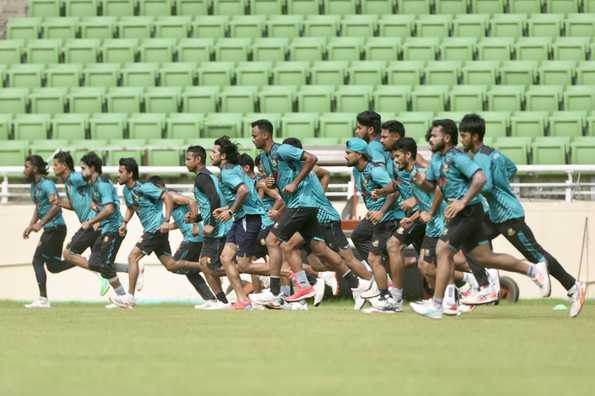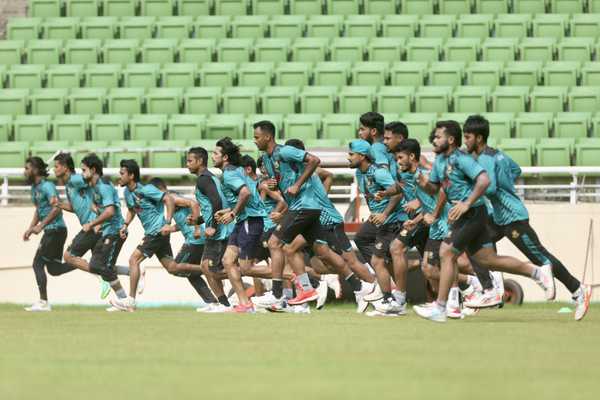FITNESS HURDLES

A number of Bangladesh cricketers failed to meet the required standards in the new 1600m time-trial test © BCB
Bangladesh’s strength and conditioning coach Nathan Kiely indicated on Tuesday (August 12) that he is not losing sleep despite several cricketers failing to meet standards in recent fitness testing. Several Bangladesh cricketers failed to live up to standards in a new fitness test conducted recently, raising eyebrows among observers. However, Kiely appeared untroubled by the results.
“I wouldn’t say there’s lacking in any area. For example, some players might not get the best time trial. But what you guys might not see is that they’ve actually got personal bests in the gym with their strength work,” Kiely told reporters at the Sher-e-Bangla National Stadium. “We’ve been focusing on the individual player and it’s all about understanding where they’re going well and where their work-ons are.”
“And the players, they see their results. They know what they need to work on and their attitude and effort towards getting better in every area is fantastic,” he added. “As you would have seen, we did some testing at the National Stadium and we did some sprint testing and a time trial. We had, I think, 12 personal bests in the time trial.”
Kiely expressed confidence that the team will be physically prepared for the UAE heat when Bangladesh competes in the Asia Cup T20 next September. “Absolutely, yeah (we will be ready) and our boys worked extremely hard. I think evidence today – if you saw some of the conditioning that we did – there were some really challenging drills.
“If you didn’t think they were challenging, I’d welcome you to come and do them with us one day. You’ll find out. Their attitude and their effort are outstanding. They push themselves extremely hard,” he said, adding that their biggest challenge is securing adequate time to prepare players physically.
“The biggest challenge for us is finding opportunities to do big chunks of physical work, which we don’t have the benefit of – like in England or in Australia, where they have a big sort of 15-week pre-season for their players, regardless of whether they are domestic or international,” he explained. “So we only get little small windows, so we’re constantly fighting that battle of trying to get physical work in wherever we get those opportunities, yeah.”
The BCB moved away from using yo-yo and beep tests to assess player fitness, introducing the more traditional 1600m time trial following Kiely’s appointment in April 2024. Kiely believes this method provides greater accuracy.
“Yeah, it’s often debated what the best test is. The reason I wanted to use a time trial was that it’s very simple for us to deliver that test. You don’t need any equipment to run four laps of an athletics track. You can measure it on any grass cricket ground as well. So, it makes it more accessible for our domestic players to do the same test as a national team. And it’s also, there’s less debate in terms of your results. When you do the yo-yo and the BEEP tests, sometimes players, they might only just miss, but it’s hard to make a call to pull them out and tell them they’ve finished,” said Kiely.
“The great thing about the time trial is that the clock doesn’t lie. My experience is the players who win the yo-yo test and win the beep test and they also win the time trial and the guys who are poor in those tests are also poor in the time trial,” he said. “So, you still get the same understanding of which players are fit and which players need to do more work, regardless of which test you use,” he added, noting that this fitness test is easier to implement for local strength and conditioning coaches.
“But the main thing for me was having an assessment that’s easy to deliver and we’re going to be really reliable with our results, whether it’s me running the test or one of our domestic divisions with NCL. We’re not going to have different results if we run the test that way,” he said.
“If we compare that to domestic cricket in England or Australia, they’ve got 20 or 30 of those trainers. We’ve got lots of local trainers who are really passionate and working very hard. And it’s about, one of my big roles is trying to help improve those guys by providing opportunities for them to build their skills,” he concluded.
© Cricbuzz

